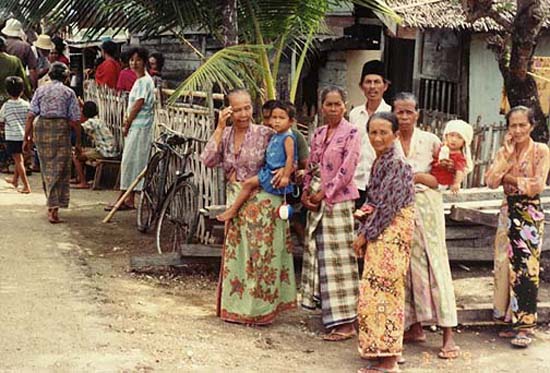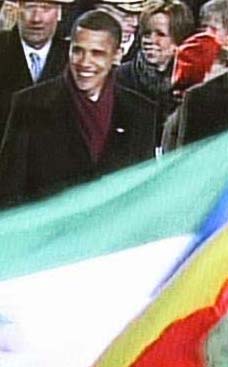
Secretary of State Hillary Rodham Clinton is scheduled to visit Indonesia on Wednesday and Thursday during her first overseas trip in her new position. In a written reply to questions during her Senate confirmation hearing last month, Clinton said she wanted to restart the Peace Corps program here. Clinton may think that sending aid workers to Indonesian villages is a good use of "smart power" that would include "the full range of tools at our disposal -- diplomatic, economic, military, political, legal and cultural," as she told the senators. But she must be careful not to stir up resentments by pushing a mainly symbolic move, said Theodore Friend, an American expert on Indonesia. "I think there is a slight to medium risk of inferred condescension," Friend said by telephone from Pennsylvania, where he is a senior fellow at the Foreign Policy Research Institute think tank. The reaction, he said, might be, "You still think of us as backward, developmentally retarded or something," because Indonesian officials would prefer to talk about matters such as the global financial crisis. Many Indonesians hope Clinton will lay the groundwork for a visit by Obama, who lived in Jakarta from 1967 to 1971.
PCOL Comment: Peace Corps needs to structure the Indonesia program like the program in Mexico recruiting "highly specialized, technically trained and experienced volunteers to work side by side with highly-skilled and specialized counterparts from the host country."
Indonesia still touchy about Peace Corps
Indonesia still touchy about Peace Corps
President Sukarno allowed the Peace Corps in 1962 as a favor to President Kennedy, but his Indonesian Communists allies accused the Americans of being spies.
The U.S., keen to improve ties with the Muslim nation, has said it would like to renew the program, which ended in 1965 amid leftist hostility. Today, some in Jakarta see it as a condescending effort.
By Paul Watson
February 17, 2009
Reporting from Jakarta, Indonesia -- The last time Indonesiaallowed Peace Corps volunteers to work here, they weren't sent into villages to teach English or build schools. The Americans were assigned to whip athletes into shape for the 1964 Olympics.
The peculiar aid to reluctant hosts didn't work out: Jakarta ended up boycotting the Tokyo Games, and thugs from the Indonesian Communist Party, which accused the American coaches of being CIA agents, ran them out of the country in 1965, less than three years after they had arrived.
More than four decades later, when Islamic extremism is considered the biggest foreign threat to the United States, the Obama administration hopes to persuade the government of the world's most populous Muslim country to let the Peace Corps return.
Secretary of State Hillary Rodham Clinton is scheduled to visit Indonesia on Wednesday and Thursday during her first overseas trip in her new position. In a written reply to questions during her Senate confirmation hearing last month, Clinton said she wanted to restart the Peace Corps program here.
Clinton may think that sending aid workers to Indonesian villages is a good use of "smart power" that would include "the full range of tools at our disposal -- diplomatic, economic, military, political, legal and cultural," as she told the senators.
But she must be careful not to stir up resentments by pushing a mainly symbolic move, said Theodore Friend, an American expert on Indonesia.
"I think there is a slight to medium risk of inferred condescension," Friend said by telephone from Pennsylvania, where he is a senior fellow at the Foreign Policy Research Institute think tank.
The reaction, he said, might be, "You still think of us as backward, developmentally retarded or something," because Indonesian officials would prefer to talk about matters such as the global financial crisis. Many Indonesians hope Clinton will lay the groundwork for a visit by Obama, who lived in Jakarta from 1967 to 1971.
Obama still speaks some Bahasa Indonesia, the local language. And he may have picked up an appreciation for development work from his late mother, Ann, who returned to Indonesia in the 1980s to research her doctoral thesis. She worked with the Ford Foundation to help set up a program that made very small loans to the poor who wanted to start a business. Today the effort is heralded as one the world's first and most successful microfinance programs.
But the U.S. government's earlier foray into development work didn't end as well.
When President Kennedy launched the Peace Corps in 1961, the "domino theory" held that a series of nations could fall under communist control if leftists succeeded in toppling pro-Western regimes in Southeast Asia.
Indonesia, an archipelago of more than 17,000 islands spread across 3,000 miles, was a prime concern, and the Peace Corps seemed a good way to improve American ties to an impoverished country with a powerful Communist Party allied with then-President Sukarno.
Sukarno, who led Indonesia to independence from the Dutch and then curried favor with the Communists in hope of holding on to power, was suspicious of U.S. intentions. He didn't want to let the Peace Corps in, but finally agreed as a favor to Kennedy, who helped push the Dutch from Irian Jaya in 1962, Friend wrote in his book "Indonesian Destinies."
The Peace Corps wanted to send 200 university faculty to Indonesia, but that "was shot down in mutual fear as too political," Friend wrote. Washington settled instead on providing 49 coaches to help train basketball and volleyball players, boxers, athletes in track and field and other teams for the 1964 Olympics.
The American instructors got paid $11 a month, and after all their effort, Sukarno decided to join North Korea in an Olympic boycott. A 50th Peace Corps volunteer, an English instructor, was assigned to the Foreign Ministry, where he "was put to work improving translations of its anti-American polemics," Friend wrote.
The Indonesian Communist Party, known by its acronym PKI, threatened them from the start, sometimes violently.
None of the Americans was injured, but the State Department shut down the program in 1965, along with other aid operations, in the turmoil leading up to a military coup by Gen. Suharto. His anti-Communist campaigns killed up to 500,000 people.
Once stability returned, several U.S. ambassadors suggested that Suharto should let the Peace Corps return, Friend said, but they never got anywhere. A decade after Suharto's regime collapsed during the 1998 economic crisis, Indonesia's government is still suspicious of American intentions when the words "Peace Corps" come up.
Teuku Faizasyah, spokesman for the Foreign Ministry, said an agenda for talks with Clinton was still being worked out. But he questioned whether the Peace Corps was the best way to improve contacts with the U.S., adding, "We are not rejecting it, but we have to be clear where it's going."
"Back in the '60s, we had limited interaction" with Americans, he said. "Their understanding about Indonesia was very little. But now, everything is open. There are many interactions between people in both countries."
Regional neighbors such as Australia and Singapore send aid workers to do community development work in Indonesia. So it shouldn't be a problem if Americans come too, as long as they stay clear of politics, said Dewi Fortuna Anwar, an expert on U.S.-Indonesian relations and a former presidential spokeswoman.
"But if it is packaged as a tool, or as an instrument of American foreign policy to send an American ideological message," she said, "I think it will be viewed with suspicion, despite the fact that Indonesia is a very open society."
paul.watson@latimes.com
Dinda Jouhana in The Times' Jakarta Bureau contributed to this report.













